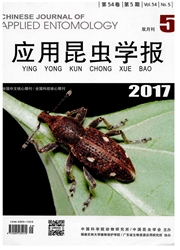

 中文摘要:
中文摘要:
天敌不仅直接捕食或寄生害虫,而且还能通过胁迫作用改变害虫的生长发育与繁殖,间接地影响害虫的适合度。本文以棉田重要害虫棉蚜却his gossypii Glover及其寄生性天敌蚜茧蜂Lysiphlebia japonica Ashmead为对象,在相同的大气二氧化碳浓度环境中研究了直接放蚜茧蜂和通过笼罩间接放蚜茧蜂所产生的胁迫作用对连续3代棉蚜生长发育与繁殖的影响。结果表明,直接放蚜茧蜂的胁迫作用使第1代棉蚜繁殖率明显下降;第2代如果继续受到寄生蜂的直接胁迫,棉蚜生长发育与繁殖得到恢复,但受到持续间接胁迫作用却使棉蚜繁殖率明显下降;第3代如果棉蚜继续受到寄生蜂的直接或间接胁迫,与当代或与前一代后一直未受到寄生蜂胁迫作用相比,其整个若虫发育历期明显延长或缩短,但其繁殖率均明显下降。我们的结果显示:评价天敌作用时,不仅仅考虑其直接的捕食或寄生作用,还应该综合考虑其“间接”的生态效应。
 英文摘要:
英文摘要:
Not only do natural enemies directly influence prey density by predation and parasitism but they can also indirectly cause the modification of fitness in their victims by modifying their development and fecundity. Experiments were carried out in OTCs with the same C02 environment to evaluate adaptation of the development and fecundity of three successive generations of Aphis gossypii Glover in response to exposure to both free and caged Lysiphlebia japonica Ashmead. We found that the fecundity of aphids in the first generation significantly decreased in the presence of free L. japonica. However, developmental duration and reproduction were restored when the aphids continued to be exposed to the free L. japonica in the second generation. On the other hand, fecundity of aphids declined remarkably when they had been exposed to caged L. japonica for two successive generations. Aphids persistently exposed to free or caged L. japonica for three successive generations displayed dramatically lengthened or shortened development during the nymphal stage and their reproduction declined coincidentally. These results emphasize the indirect effects of natural enemies on the population dynamics of successive generations of A. gossypii.
 同期刊论文项目
同期刊论文项目
 同项目期刊论文
同项目期刊论文
 Shelterbelts in agricultural landscapes enhance ladybeetle abundance in spillover from cropland to a
Shelterbelts in agricultural landscapes enhance ladybeetle abundance in spillover from cropland to a 期刊信息
期刊信息
